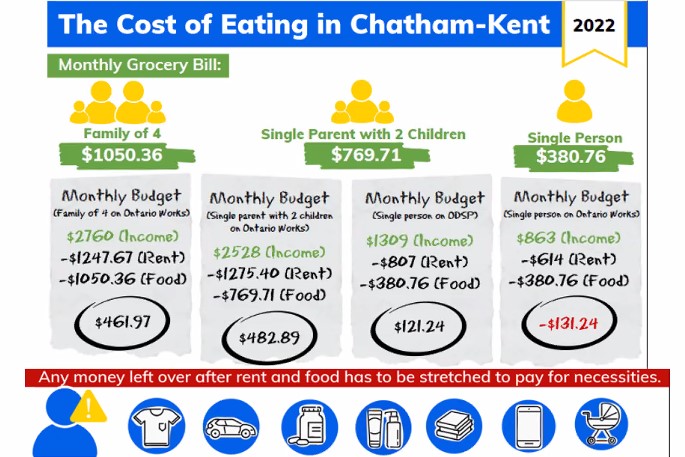
Chatham-Kent’s health unit is sounding the alarm on food insecurity after recent studies showed that one in five local households struggle to keep food on the table.
In 2022, Chatham-Kent Public Health collected data on grocery prices through its Nutritious Food Basket survey, which was then compared to the Canadian Income Survey, which examines the income and income sources of Canadians.
According to those studies, almost 20 per cent of households in Chatham-Kent (one in five) are food insecure. This means they are either worried about running out of food, have a limited food selection, are compromising the quality and/or quantity of food, have missed meals, have reduced food intake, or went a day or more without food, all due to lack of money to purchase food.
“The COVID-19 impact with the economic downturn, the increasing inflation, and the increasing cost of food has only made food insecurity worsen. Food insecurity doesn’t occur because of these pressures, but it gets worse,” said Public Health Nutritionist Sharmini Balakrishnan.

Based on data collected from six different grocery stores in the municipality, public health said the cost of feeding a family of four in Chatham-Kent in 2022 was $1050.36 per month or $242.58 per week. However, this does not account for inflation or other increases in food costs since that time.
A family of four with a median income spends around 11 per cent of their income on food, however, in comparison, a family of four receiving Ontario Works financial assistance spends 38 per cent of their income on food.
A report from public health stated that families and individuals living on low incomes in Chatham-Kent are facing significant financial pressures with little, if any, money left over to cover other monthly expenses.
“With people not able to afford the cost of rent and the cost of food, we know that food insecurity is public health issue, because this leads to severe mental and physical health impacts. It can lead to mental health disorders, non-communicable diseases such as heart disease and diabetes, and increased risk of infections. This all leads to an increase cost to our health care system,” said Balakrishnan.
The health unit said studies have shown that food insecurity is primarily associated with inadequate income and household financial constraints, not food costs.
As such, the Ontario Dietitians in Public Health sent a letter to the provincial government in October to advocate for an increase in social assistance and minimum wage rates to reflect the cost of living and inflation. As well, the group is calling for a reduction of income tax rates for the lowest-income households.
During a meeting on Wednesday, the Chatham-Kent Board of Health approved a motion to send a similar letter to the Ontario government to push for policy changes to help address food insecurity across the province.




